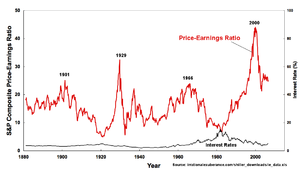 Image via Wikipedia
Image via Wikipedia
In the stock markets, prices are fixed by the interaction between buyers and sellers. The price of a share at any given moment of time depends upon the relative pressures exerted by the buyers and sellers of that particular share on one another. The balance or point of equilibrium reached between these two opposing pressures is the price at which actual transactions take place. Price, thus, represents the point of agreement reached between buyers and sellers.
Price movements are caused by variations in the strength of buying and selling pressures. If the buying pressure increases, the equilibrium is upset and the share price moves up to a higher level where a new balance is struck between buyers and sellers. The price of a share at any given point thus represents only a temporary equilibrium between buying and selling pressures.
![Reblog this post [with Zemanta]](http://img.zemanta.com/reblog_e.png?x-id=d848cff3-a6d8-4b6d-9e69-7ffbd6ee8a25)
![Reblog this post [with Zemanta]](http://img.zemanta.com/reblog_e.png?x-id=3366f048-6406-4c79-8697-28524bdb9bb6)
![Reblog this post [with Zemanta]](http://img.zemanta.com/reblog_e.png?x-id=f3ec21ad-7adf-4f09-ba77-ffce8c1bef9c)


